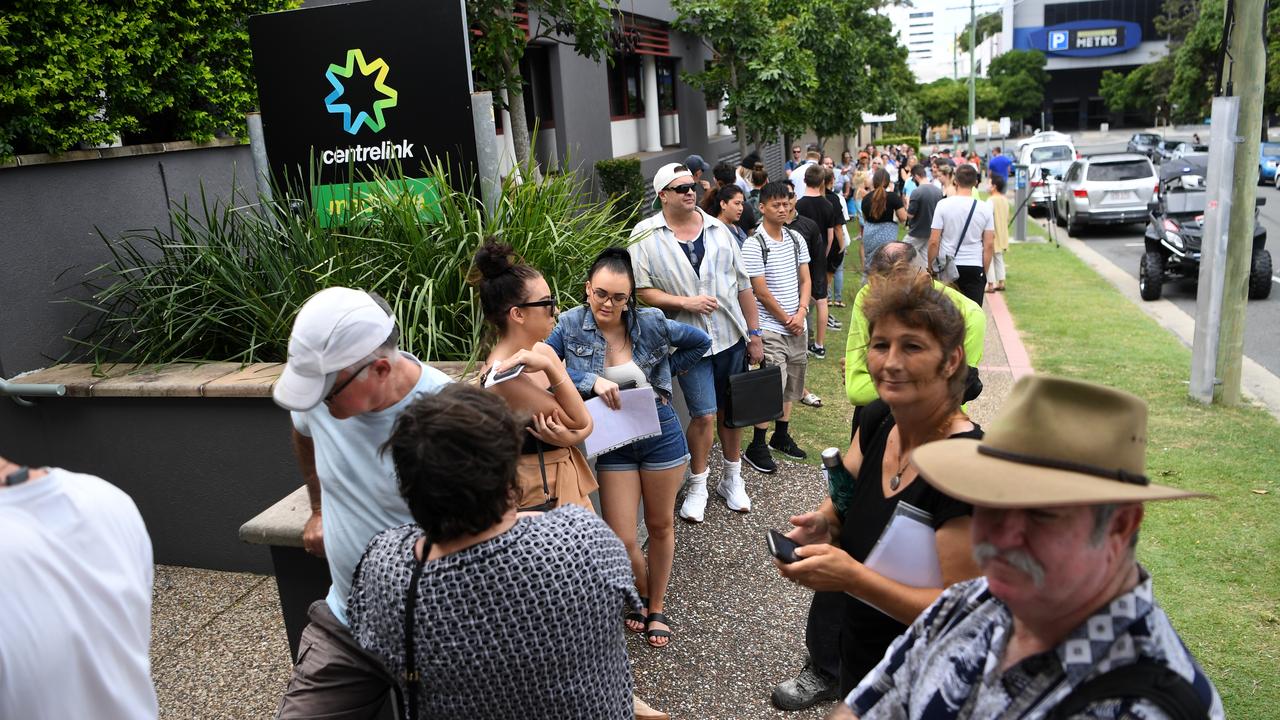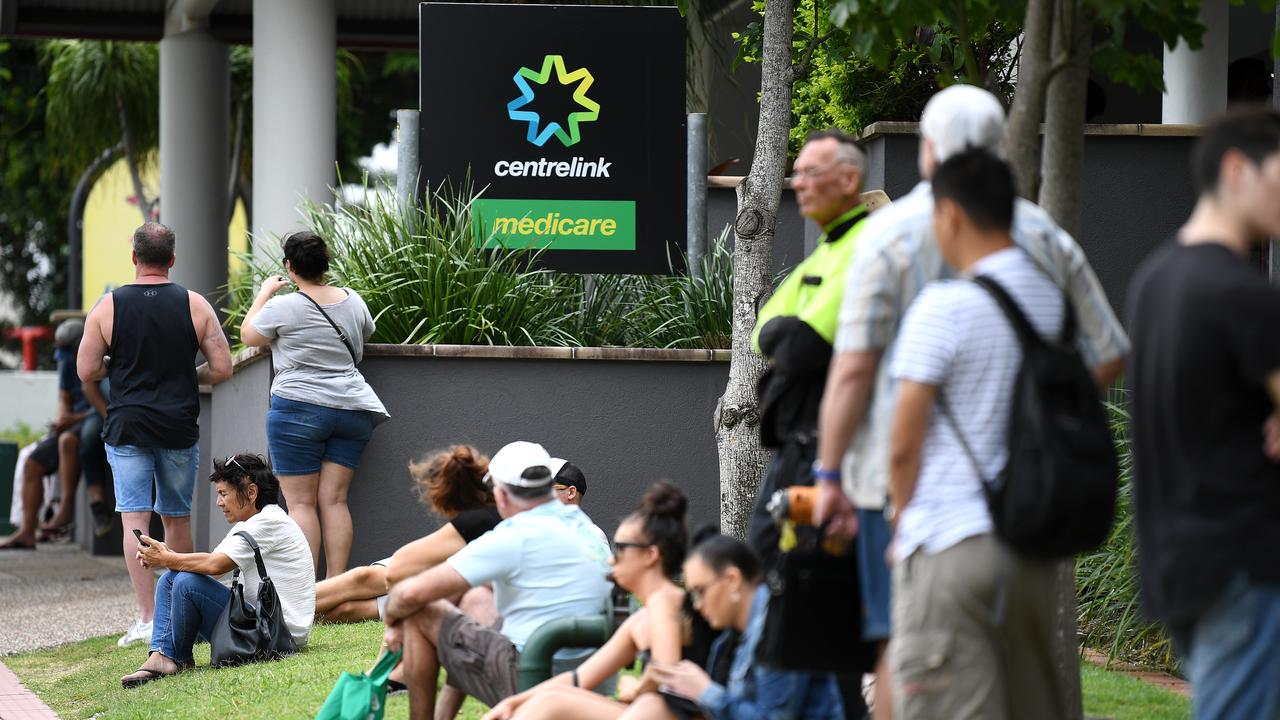Concern over ‘mutual obligation’ requirements for JobSeekers as unemployment surges
As businesses re-open, the government is making changes to how it deals with Australia’s jobless. There are fears it will return to “harsh” measures.
Hundreds of thousands of Australians who lost their jobs due to the coronavirus pandemic have so far been shielded from experiencing what it’s really like to be unemployed but that is set to change.
The Morrison government has begun winding back some of the exemptions it brought in after the outbreak to cushion many from the harsher aspects of Australia’s unemployment system, and this month it is reviewing many of its programs, which could have consequences for those who don’t “snap back” into employment.
The changes will impact more than 1.5 million Australians who are now unemployed and relying on JobSeeker payments, which were brought in to replace the old Newstart allowance.
Previously, there were just 686,785 people receiving Newstart in June 2019. It’s been estimated that about half of these Australians were living in poverty.
Now that the coronavirus pandemic has caused widespread job losses, there are concerns more will be forced to live under financial pressure and the stress of having to look for jobs during a recession.
Last month Prime Minister Scott Morrison revealed 900,000 JobSeeker claims had been processed in just six weeks and there were now more than 1.5 million on the payment.
As restrictions slowly ease, these people will increasingly be expected to interact with Australia’s unemployment system in order to keep their payments.
This week, those on the JobSeeker payment will start having to undertake “mutual obligation” requirements, a feature of the previously criticised Newstart payment.
It means they must attend at least one appointment with their employment services provider either online or over the phone to talk about training, upskilling or employment. At this stage there will be no penalty if they fail to do this.
However, this was not the case before the pandemic and there also used to be a lot more obligations on jobseekers.
“The re-introduction of mutual obligations will be gradual and based on a phased approach,” Employment Minister Michaelia Cash said.
“As businesses across Australia reopen or begin to operate at full capacity, new job opportunities will become available.
“The return of mutual obligations will enable jobactive providers to connect job seekers to employers and ensure job seekers are aware of opportunities available for training, upskilling or employment.”
But some are worried about a return to the previous harsh system and there are now calls for the government not to reinstate this.
RELATED: JobSeeker leaves recipients facing huge income cliff

SYSTEM WAS ‘NOT WORKING’
Under the compliance system before COVID-19, some people had to search for 20 jobs a month, participate in Work for the Dole and attend regular appointments with employment service providers under pain of losing their next payment.
“Payments were automatically suspended on the same day if someone didn’t attend a provider appointment regardless of the reason, and people had to contact their provider to get payments reinstated. In many cases, people weren’t even aware of the appointment,” Australian Council of Social Service (ACOSS) chief executive officer Dr Cassandra Goldie said.
“This system was harsh, and caused a great deal of anxiety for people.”
A Senate inquiry into Newstart, which began its investigations before the coronavirus pandemic and delivered its report in April, also found the mutual obligations requirements were “not working” and not leading to positive employment or education outcomes for many people.
“Instead, evidence received by the committee suggests that the system has become increasingly complex, punitive, inadequate and ineffective in getting people into work,” the committee’s report said.
“Accounts of people having to apply for jobs that do not match their skills or people having to attend training for qualifications that will not lead to employment are far too common.
“The system itself appears to have become a significant barrier to work.”
As Dr Arthur Chesterfield-Evans, a medical doctor and retired member of the NSW Legislative Council, told the Senate inquiry, “those who chronically cannot find work remain on Newstart and the demeaning effect of continually applying for jobs that do not exist must demoralise even the most resourceful person”.
Minister Cash has indicated the 20 search job requirement won’t be part of the government’s phased approach, and the while it’s not yet clear what the requirements will be, the number of applications will be lower than 20.
She has also defended jobactive, the government’s program to get people back into work, which she said had been very successful, getting 1.6 million people back into work over five years.
Ms Cash said the program had also achieved a 91 per cent reduction in financial penalties compared to Labor’s previous system under Jobs Services Australia.
Surveys conducted by the Employment Department found 58.9 per cent of people were “satisfied” or “very satisfied” with the quality of services they received, she said.
Despite this, Ms Cash said a new model for employments services will be introduced from July 2022 as part of the Morrison government’s plan for a stronger economy.
“For job seekers, the new model will provide modernised service options to support them to find a job, a better digital platform and more flexibility to meet mutual obligation requirements,” Ms Cash said.
Key components of the new model are being trialled in two regions, in Adelaide South and the Mid North Coast of NSW.
“While the new employment services model will have many new components, the most important will be allowing those most capable to serve themselves in re-entering the job market,” she said.
“Critically, this will redirect resources to be better spent on those who face the greatest barriers into the job market.
“Requirements on job seekers will continue to be informed by labour market conditions.”
However, it’s unclear whether the rate of unemployment payments will be increased.
The Senate inquiry found that previous levels of Newstart payments, which provided people about $270 a week to live on, were inadequate and that some people were likely living below the poverty line.
When the Morrison government introduced the JobSeeker payment in response to the pandemic, it effectively doubled the amount of money provided to those who were unemployed.
Many are now worried that payments will be wound back to their previous rate.
“We can never go back to the brutality of trying to survive on $40 a day,” Dr Goldie said.
“We need a secure safety net that protects us all from poverty.”

‘YOU GET A TIGHT KNOT IN YOUR STOMACH’
Dr Goldie said the ongoing JobSeeker payment must ensure everyone could keep a roof overhead, food on the table and the lights on.
“Our social security system must protect people from poverty. People must to be able to meet their basic needs including housing, food, utilities, and medical costs, and families must have enough to care for their children,” she said.
Jessica, who has not had full-time work for eight years, told news.com.au that getting an extra $250 a week, along with the Morrison Government’s $750 cash payment meant she’s been able to get her wood heater repaired, her toilet fixed and is saving for a new car engine.
The 65-year-old who lives in Gippsland, just outside of Melbourne, used to work as a community campaigner at a not-for-profit organisation and in the building industry before having her hours dramatically cut during the 2007 global financial crisis.
“I was still doing a few hours but then it went practically to nothing,” she said.
Although she has applied for many jobs since then, including for work as a receptionist, a park ranger or even working in a library, she has only been able to secure a few hours of work per week of caring and cleaning.
This is also not ideal because she has osteoarthritis and so can’t do more than a couple of hours at a stretch.
“I think it’s to do with age really,” she said. “I’ve applied to be a receptionist for a local community health centre and other jobs like that but a lot of people go for those,” she said.
She instead had to adapt to living on Newstart over the long term, and find ways to pay for those extra bills that she doesn’t have spare money for.
Jessica is lucky that her mortgage payments are only $160 a week so that leaves about $100 of her Newstart payment for everything else she had to pay for.
“You scrape by and if you have got a big bill, you negotiate to pay that in small amounts, You are constantly juggling that small amount of money.”
In the past she has got food parcels from the Salvation Army and taken food from other volunteers at her local community garden. She said she had got very good at “minute budgeting”.
“You know exactly how much the washing detergent costs, and that it’s $1.50 for two litres for the cheapest brand,” she said.
“You get a tight knot in your stomach if you go shopping or get a bill in the mail or online,” she said. “The best way is to keep away from the shopping centre I’ve found.”
Jessica believes unemployment payments should be increased so people don’t have to live below the poverty line and this would actually help people to find jobs as they wouldn’t be obsessing over what they were going to eat or how they were going to pay for their electricity bill.
“It acts as an incentive, once you pay off things you need and get food, you can actually get to work and take control of your life because you are not worrying about what bill to pay, or how to get heating in your house,” she said.
“Your daily needs of shelter, food, heat – those have to be covered before you are resilient enough to go out and look for work.
“For example my volunteer work could turn into a paid job but you need extra time and enthusiasm to get something like that going.
“If someone’s phone is cut off that means they can’t chase up (opportunities), if the internet is cut off, you can’t get online and if the car is cut off, you can’t go to an interview.”
Jessica’s tight budget means that she worries about food and doesn’t have money for anything out of the ordinary.
This includes finding $170 to get her wood heater fixed. She said the piece of metal that stopped the fire from going up the chimney had warped and needed to be replaced but she couldn’t afford it until her payments were increased.
“I used it but it was probably unsafe,” she said. “I have other heaters but I don’t use them because of bad electricity bills.”
She also had to live with a broken toilet that dripped. She used a bowl to collect the water that would otherwise have fallen on the ground.
The motor on her car broke recently and she’s now saving for it to be replaced.
“Otherwise I won’t have a vehicle, which will restrict the kind of work I can do.”
She said she had a friend who would be spending his $750 one-off payment to pay for a course to be a forklift driver.
“He’s actively looking for opportunities but often those opportunities are stymied by the lack of those daily necessities.”
Continue the conversation @charischang2 | charis.chang@news.com.au




